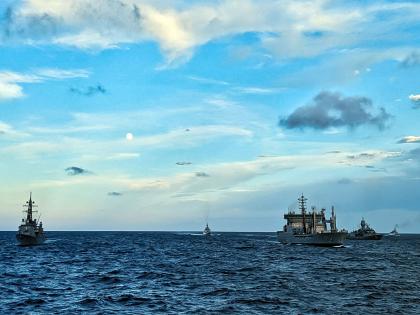India to join Malabar Naval Exercise in Guam with Shivalik-class warship
By ANI | Updated: October 31, 2025 20:45 IST2025-10-31T20:40:44+5:302025-10-31T20:45:14+5:30
New Delhi [India], October 31 : India will participate in the upcoming Malabar naval exercise alongside the United States, ...

India to join Malabar Naval Exercise in Guam with Shivalik-class warship
New Delhi [India], October 31 : India will participate in the upcoming Malabar naval exercise alongside the United States, Japan, and Australia, with the Indian Navy confirming the deployment of a Shivalik-class stealth warship to Guam in the US for the duration of the drills.
"We are participating in Exercise Malabar, and our warship, which is a Shivalik-class warship, will be in Guam in the US, and it will be there for the entire period of the exercise," the Indian Navy said on Friday.
India is set to join the next edition of the Malabar exercise in Guam in November, marking another step in strengthening the operational coordination between the Quad nations India, the US, Japan, and Australia.
The exercise will take place at Guam, a US island territory located in the western Pacific Ocean, roughly halfway between Japan and Australia. The region serves as a key maritime hub for Indo-Pacific security cooperation.
Originally a bilateral exercise between India and the United States, Malabar gradually expanded to include Japan and later Australia, bringing all four Quad partners into one of the Indo-Pacific's most significant naval collaborations. Though the Quad is not a military alliance, the exercise serves as a platform to strengthen maritime security and uphold freedom of navigation in the region.
India is also scheduled to host the next Quad summit, with Australian Prime Minister Anthony Albanese recently reaffirming the grouping's importance for regional cooperation during his visit to Malaysia for the ASEAN forum.
"The Quad is an important forum and an important vehicle for us to engage Australia, the United States, Japan and India. I'm hopeful there will be a meeting in the first quarter of next year. Prime Minister Modi is due to host the Quad meeting," Albanese said in Kuala Lumpur.
Separately, the Indian Navy announced that it will organise the International Fleet Review (IFR) in Visakhapatnam in February 2026, where President Droupadi Murmu will review the fleet. The event will feature India's indigenous aircraft carrier, INS Vikrant, as well as Kalvari-class submarines, and participation from over 50 countries, including the United States and Russia.
Navy Vice Chief Vice Admiral (VAdm) Sanjay Vatsayan said, "Both the US and Russia have confirmed participation in the international fleet review and Milan exercise. They would be sending their ships. Some aircraft are also expected.
Addressing the press briefing, he added that a large number of countries had been invited to the event and that over 50 countries have expressed their willingness to attend the IFR, Milan exercise, as well as the Indian Ocean Naval Symposium (IONS).
"We have extended invites to a large number of nations, and so far, we have received responses from over 55 countries that have expressed their willingness to attend all three events. A very large number of navies are also participating through high-level delegations in addition to sending their ships. However, as you are aware, we still have four months to go. These numbers will change as more confirmations are received. And as geopolitics evolves, we cannot predict what will happen in 7 or 15 days. So there will be a change in the numbers. However, we are definitely expecting more than 55. And yes, both the United States as well as Russia are participating. They have indicated that they will be sending their ships, and we are also expecting some aircraft, maybe, but it's still work in progress," he said.
Vice Admiral Vatsayan also addressed the presence of foreign powers in the Indian Ocean region, stating that the Navy is constantly vigilant and monitors every vessel operation in the Indian Ocean region, as well as being aware of challenges across all spectrum.
"There is a continuous presence of extra-regional powers in the Indian Ocean region due to the ongoing situation. It has always been that, and it's only increasing. At any given point in time, we have a minimum of 40, and sometimes even more than 50, ships operating in the Indian Ocean region. To assure all of you, we are monitoring each one of them. We are aware of what they're doing, what they're likely to do, when they come in, when they go out, etc. Challenges remain. You've seen what has happened in Madagascar. However, the bottom line remains that the Indian Ocean is the primary source of goods and oil transit for the world. That does not change. And with it, it brings its associated challenges with respect to both traditional and non-traditional issues. It is across the spectrum that we look at, from piracy to human trafficking to drugs and so on. These challenges are present, and we are aware of them. We are ready to meet any contingency," he said.
Disclaimer: This post has been auto-published from an agency feed without any modifications to the text and has not been reviewed by an editor
Open in app